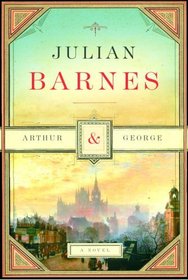I thought this was good, but not great. The first third or so, which outlines George Edalji and Arthur Conan Doyle's respective childhoods was my favorite part. I found that the central portion dragged, and I agree with other reviewers that it could have been shorter. Still, I think Barnes captures turn-of-the-century Brits well, and does a nice job of using a famous real character (Doyle) to draw a portrait of the age.
Helpful Score: 4
This would have made a great short story or novella. At over 400 pages it just became tedious. Sections alternate between the two main characters - Arthur Conan Doyle and George Edalji - to set up their eventual combined story but, by the time Barnes gets there I was bored with them both and not finding anything exceptionally likable about either one, a fault I am sure lay in Barnes's writing style.. Drawn from a real life criminal case in which Doyle became involved, there should have been the potential for a much more exciting tale spun.
Helpful Score: 1
Two very different lives become entwined due to a disgraceful miscarriage of justice. Use of actual letters and newpaper reports from the time make this feal more like a true story than a fictional account. Very skillfully written. Based on real events and people, with plenty of asistance from the author's imagination. A must for anyone interested in the work of Arthur Conan Doyle, creator of Sherlock Holmes, or the legal and social structure of England in the early 1900s.
Helpful Score: 1
An interesting book about late 19th century English life as seen through the eyes of two men who seem very different but who also share some similarities. At times I felt the story lagged as the author focused on George and then a long section on Arthur, but when the two men meet and Arthur agrees to help George, the book regained my interest. I also liked learning about how Arthur created his fictional detective, Sherlock Holmes.
Helpful Score: 1
I've heard great things about this author, and to be fair, I would give him another shot with a different book. I thought the writing itself was great, just not the story. Initially, given that I love Sir A. Conan Doyle, I thought this would be perfect for me.
The problem is that the shift between the two characters (Arthur and George) takes place so abruptly and so constantly, it's very jarring, especially in the beginning when you're looking to connect and engage with the story. I didn't care what happened until well past the halfway point of the book, then I cared for a little while, and then stopped caring again.
Also -- and this is my own fault, really -- I didn't know this was based on truth until the end. The whole time I was reading, I kept thinking, OK, I know Arthur was a real person, but who the heck is George, and why should I care??
Truth be told, as the story concluded, I still didn't care. And I'd argue that George was more important to the story. I think Barnes may have gotten a little too wrapped up in researching and conveying history rather than writing a compelling story.
The problem is that the shift between the two characters (Arthur and George) takes place so abruptly and so constantly, it's very jarring, especially in the beginning when you're looking to connect and engage with the story. I didn't care what happened until well past the halfway point of the book, then I cared for a little while, and then stopped caring again.
Also -- and this is my own fault, really -- I didn't know this was based on truth until the end. The whole time I was reading, I kept thinking, OK, I know Arthur was a real person, but who the heck is George, and why should I care??
Truth be told, as the story concluded, I still didn't care. And I'd argue that George was more important to the story. I think Barnes may have gotten a little too wrapped up in researching and conveying history rather than writing a compelling story.





